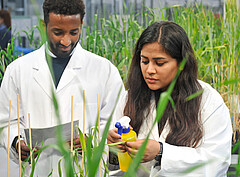Modern breeding research for chemical-free plant protection [10.01.23]
This is a promising alternative to chemical fungicides. Using epigenetics, i.e. targeted control of gene activity, researchers in the BarEpiEdit project want to develop an innovative, environmentally friendly technology to offer protection against fungal diseases in plants. Prof. Dr. Aline Koch, previously with the Department of Phytopathology at the University of Hohenheim, is the coordinator of the project, in which the Justus Liebig University Giessen is also involved. The Federal Ministry of Education and Research (BMBF) is funding the project to the tune of approximately EUR 580,000 in total, including EUR 490,000 for the University of Hohenheim.
It is not only the genetic make-up – the DNA – of an organism that determines its traits but also whether and how the information contained therein is used. This is controlled, among other things, by what is known as the epigenome: modifications to specific DNA loci prevent the reading of genetic information there. In many cases, this occurs through the binding of small molecules, the methyl groups, to the DNA building blocks. In this process, the genetic information itself is preserved. Once the methyl groups have been removed, the genetic information can also be read again.
The researchers in the BarEpiEdit project would like to gain a better understanding of this process and then exploit it. The focus of their interest is on, by way of example, the resistance of barley plants to two pathogens of fungal diseases, those of powdery mildew (Blumeria graminis f. sp. hordei) and Fusarium graminearum.
Their goal is to make epigenetic modifications to existing immunity genes in plants and, in this way, to increase their resistance to diseases and pathogens. To this end, the researchers first analyze in detail the natural modifications to the barley DNA triggered by the fungal infection.
The goal here is to identify the genes that are responsible for the plants' immunity to the pathogens. They will be modified for the first time using the molecular mechanism of transcriptional gene silencing (TGS). With the aid of modified "gene scissors" of the CRISPR-dCas9 type, they are epigenetically edited (EpiEdit), i.e. epigenetically modified. In the long term, the knowledge gained is to be transferred to other crops.
Prof. Dr. Aline Koch was a research associate in the Department of Phytopathology at the University of Hohenheim until the end of October. She moved to the University of Regensburg on 1 November 2022. There, she is Director of the Plant RNA Transport Department. The funding remains with the University of Hohenheim. The Department of Phytopathology manages the funds.
Project details
- Title: Epigenetic editing of immunity genes to improve disease resistance to fungal pathogens using the example of barley (Hordeum vulgare) – BarEpiEdit
- Funding amount: EUR 579,370 in total, including EUR 493,472 for Hohenheim
- Funding institution: Federal Ministry of Education and Research (BMBF)
- Project duration: 1 July 2022-30 June 2025
- Project participants
Coordination: Prof. Dr. Aline Koch, University of Regensburg
Cooperation partner: Jun.-Prof. Dr. Chang Liu, Department of Epigenetics, University of Hohenheim
Cooperation partner: Dr. Antje Richter, Justus Liebig University Giessen
Administration: Department of Phytopathology, University of Hohenheim
Contact
Prof. Dr. Aline Koch, University of Regensburg, Department of Plant RNA Transport+49 941 943-3023, aline.koch@biologie.uni-regensburg.de
Jun. Prof. Dr. Chang Liu, University of Hohenheim, Department of Epigenetics+49 711 459-22180, chang.liu@uni-hohenheim.de
Heavyweights of research
The series “Heavyweights of Research" presents outstanding research projects with a financial volume of at least 350,000 euros for research requiring equipment or 150,000 euros for research without specialized equipment.


